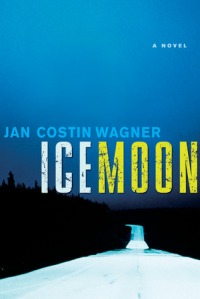For German Literature Month 2014 one of my selections (on a tip from Caroline) was Jan Costin Wagner’s fantastic crime novel Silence. There’s a film made of Silence btw, so if you’re not into reading crime, but you like watching crime, then the film comes highly recommended. Author Jan Costin Wagner is German and lives in both Germany and Finland with his Finnish wife. His crime series featuring detective Kemmo Joentaa is set in Finland but written in German. Since I enjoyed Silence so much, I decided to go back to the first book in the series: Ice Moon.
Ice Moon begins with the death of Joentaa’s wife from Hodgkin’s disease, and the book, a police procedural, follows two narrative arcs–the actions of a seemingly innocuous young man who is a serial killer, and the actions of Joentaa who’s hot on the killer’s trail. Sections in the chapters jump back and forth between focus, and sometimes, for a few sentences of this third person narrative, it’s impossible to clarify whose mind we are in: the killer’s or Joentaa’s. While I disliked the confusion, it’s a technique which reinforces the similarities between the killer and the man who is trying to capture him. The similarities are mindset connections and are also ways in which Joentaa understands the killer’s motivations. When the first body turns up–a woman killed in her bed, Joentaa’s short-tempered boss, Ketola, suspects the culprit is either a lover or a burglar. Joentaa is convinced that the murder isn’t random, and when a second corpse is discovered, Joentaa is certain they have a serial killer on their hands–Ketola thinks the two crimes are unrelated.
 Joentaa’s wife, Sanna, dies on page one, but she appears throughout the book in her husband’s fluid memories. Joentaa, obviously, is severely depressed, and Ketola thinks Joentaa has no business returning to work. Work, however, for Joentaa, is a welcome distraction, and the business of death helps Joentaa connect to the killer’s mind. The killer is a very creepy human being, and because he seems so harmless, he’s also very dangerous.
Joentaa’s wife, Sanna, dies on page one, but she appears throughout the book in her husband’s fluid memories. Joentaa, obviously, is severely depressed, and Ketola thinks Joentaa has no business returning to work. Work, however, for Joentaa, is a welcome distraction, and the business of death helps Joentaa connect to the killer’s mind. The killer is a very creepy human being, and because he seems so harmless, he’s also very dangerous.
We get a good look at a very troubled Ketola, that “model of self-discipline,” who’s retired in Silence, and frankly he’s the best character in the book.
Joentaa had always respected Ketola but never liked him. For a time he’d even considered putting in for a transfer, but Sanna had dissuaded him. His addiction to harmonious relations was almost unbearable, she said with a wry smile, but she couldn’t believe that anyone who had fought so hard to get into the CID would throw in the towel after a few harsh words from his boss. Although annoyed with her, Joentaa had known she was right.
Structurally the novel’s premise is problematic for the first in a series. Readers have no emotional investment in either Sanna or Joentaa, so we can’t really mourn along side of our main character. Sanna is dead on page one, and the mourning, the loss, the depression carries on throughout the novel. Sanna’s parents, deep in denial about their daughter’s health (aided and abetted by Joentaa’s poor communication with his in-laws), seem to be more stock characters than human beings. For this reader, killing off the spouse of a main character immediately on page one of the first book seems dicey. I’m thinking of Ruth Rendell’s Inspector Wexford novels. Wexford’s sidekick, Mike Burden’s wife became ill and subsequently died well into the series. The news is broken gradually to the reader and the emotional investment in the characters, already well established, continued throughout the books.
I’m not an author; I’m a reader, and I found this novel problematic and rather depressing. When Ketola tells Joentaa he should stay home, I agreed. Joentaa is a mess. Sanna’s death overwhelms the crime section of the novel, and yet since these are new characters, it was impossible for this reader to catch the appropriate wave of concern. Ice Moon did not come close to the excellence of Silence. If I’d read Ice Moon first, I doubt I would have bothered with the rest of the series. The first book is often the weakest, often almost a throwaway when it comes to jumpstarting a series. Ice Moon sets up its series parameters: Joentaa is a lonely man, a widower who is committed to the region and to solving crime, but I found it hard to whip up much enthusiasm for the main character. The quality of Silence convinces me to continue the series in spite of being disappointed in this novel.
Translated by John Brownjohn


I’m sorry to hear this didn’t live up to your expectations. I liked it a great deal, loved the mood, even though it was depressing. I even liked that we’re thrown into his grief like this. I could imagine you’ll like the next one again.
I have two more of his here to read. I’m glad I read Silence first…
Flûte, I’ve got this one on the shelf.
After reading your review, I’m afraid it’s going to sit there a while longer!
Yes, it doesn’t leap up the TBR pile I have to admit. Not that I have a copy to be fair.
I’ve read it now and I fully agree with your review. (how surprising)